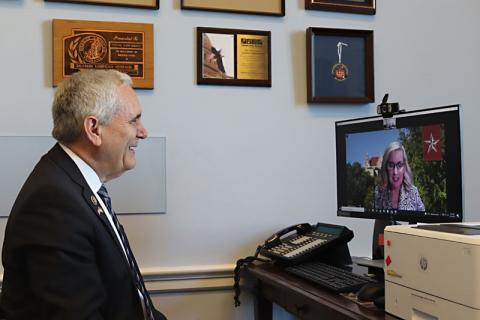Austin Chronicle: Rep. Doggett Secures $2M for Central TX Mental Health Data Map

On March 21, Rep. Lloyd Doggett, D-Austin, announced that he has secured $2 million in federal appropriations for the new Central Texas Community Mental Health Surveillance Collaborative, a project that aims to create an interactive map of mental health data similar to local COVID dashboards. The project, one of 10 chosen from a community project funding request, is being designed by Texas State University's Dr. Melinda Villagran and Dr. Alessandro De Nadai. Villagran says when the pandemic hit in March 2020, she was struck by the simple visual language of COVID dashboards: "There's a lot of data available, but very few of us have the bandwidth to look at it, find it, understand it, and use it every day. I found it to be a visual way to make sense of what was happening. And I thought, man, we need one of these for everything!"
Since the pandemic began, mental health issues have been on the rise in certain communities – including teachers, parents with kids at home, and health care professionals. Villagran saw the need to comprehensively map where issues are occurring and where there are resources nearby. "To be very clear, we are not using private health data. Our goal is not to violate any individual's confidentiality, but rather to look at things in a more community-level way, such that we can understand issues that are happening and see how they change over time."
Villagran has already partnered with Austin Public Health and groups in the Hill Country, San Antonio, and Comal and Hays counties, among others. She uses APH's open data portal to look at the social determinants of mental health issues, using data from "hospital admissions, EMS, people going through the court system. There are indicators that are really closely associated with mental health challenges, and there are others that might or might not be, but when you find where they overlap, that's more clear than if we didn't look at all of [them] together."
The map will include the I-35 corridor between Round Rock and San Antonio, with data from Travis, Hays, Comal, and Bexar counties. Villagran stresses that unlike federal data for metro service areas, which would isolate Austin from San Marcos, for example, she wants her map to be integrated: "In reality, increasingly, people live and work between San Antonio and Austin. They live in New Braunfels, and they work in Austin. They live in Austin, and they work in San Marcos. The reality is that where we live and work is linked."
In a press release, Doggett says the map tool will prove useful for "public health planners, school counselors and veterans' assistance groups," but Villagran adds that policymakers especially will benefit from the resources component. "There is nothing that I know of that links a need with the resources available to address that need, so you can see those two things happening together in the same community. Like a COVID dashboard, we will not seek to tell people how to interpret the information, we will be creating a simple place to find the information. So if you're a clinician or policymaker, you can stay up to date."